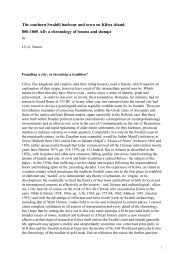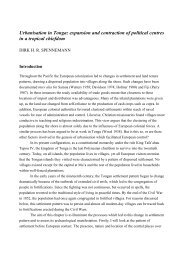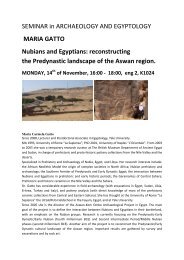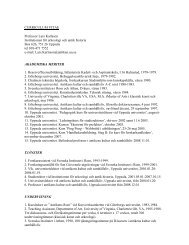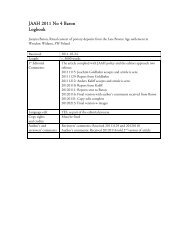Beowulf - Institutionen för arkeologi och antik historia
Beowulf - Institutionen för arkeologi och antik historia
Beowulf - Institutionen för arkeologi och antik historia
Create successful ePaper yourself
Turn your PDF publications into a flip-book with our unique Google optimized e-Paper software.
106<br />
You have adopted the custom of the old Roman stock waging war with arms,<br />
dispensing justice peacefully. How fair (good) that he is the first whom every<br />
decoration favours supported by both advantages (goods), weapons as well as<br />
laws! The vigour you possess, with a prosperity granted by heaven, is proved by<br />
the promptly vanquished Saxon and Danish peoples. Where the river Bardaa runs<br />
with a meandering course, there the enemy’s army was defeated by your leader<br />
ship. You held the command over half the army at that time; how well-deserved<br />
does he win who does what you bid! (55) As a victor you were sweating under<br />
the weight of the coat of mail and you were flashing in the cloud of dust, and<br />
fighting you pursued the fleeing army, until the transparent waves of the Lagona<br />
(the Lahn) set bounds. To him who powerless fled the river gave a sepulchre: For<br />
the prosperous leader the rivers wage war.<br />
To begin with the intruders are called Saxons and Danes. That may of course be just<br />
a paraphrase for enemies, but Venantius is on the other hand well informed about the<br />
northern peoples since in Book ix, poem 1 he knows something that we also know,<br />
namely that the Jutes lived between the Danes and the Saxons.<br />
Generally speaking, enemies whom the Merovingian army set out to destroy after<br />
negotiating with their emissaries would have been known by their proper names in<br />
Metz because the embassy itself would hardly conceal its identity from its antagonists.<br />
The most intriguing part of the description is the introduction of the two rivers Lagona<br />
and Bordaa. They testify to a surprisingly minute interest in rivers in a poem in which the<br />
only other river mentioned is the Nile ‘recreating Egypt when it rises’(v. 35).<br />
Lagona is Latin for the river Lahn, a tributary to the Rhine, but Bordaa is the<br />
purely Germanic name for a river which we do not know precisely where to locate.<br />
When the enemy panic they are driven into the transparent waves of the Lahn and<br />
that indicates somewhere at the lower part of the river. Saxons and Danes must<br />
originate from the north and their following the Lahn Valley is most reasonable if they<br />
want to cross the Rhine either at Koblenz or at Mainz in order to pillage more central<br />
parts of Austrasia. Lupus, on the other hand, comes from the south with the army.<br />
We may wonder why Venantius should find it essential to inform us that Lupus was in<br />
command of half the army, rather than an army. The information stands out as so<br />
peculiar that it is probably a fact and an indication that during the campaign the<br />
Merovingian army was actually divided into two halves.<br />
There is a point in this division since if the King was at Metz and the enemy<br />
standing in the Lahn Valley, then there were two ways in which to meet it, depending<br />
on where the enemy was planning to cross the Rhine, at Koblenz or Mainz. Lupus<br />
commands one half and he proceeds either via Trier or Mainz. We find a similar<br />
piece of precise information in line 56 when Lupus wins the battle and Venantius says<br />
that ‘fighting you pursued the fleeing army’, thus indicating that the intruders panicked<br />
in defeat.<br />
This brings us to the identification of Bordaa. The meaning of the word is simple<br />
enough. Bord means swamp or moor water and the suffix -aa means running water



